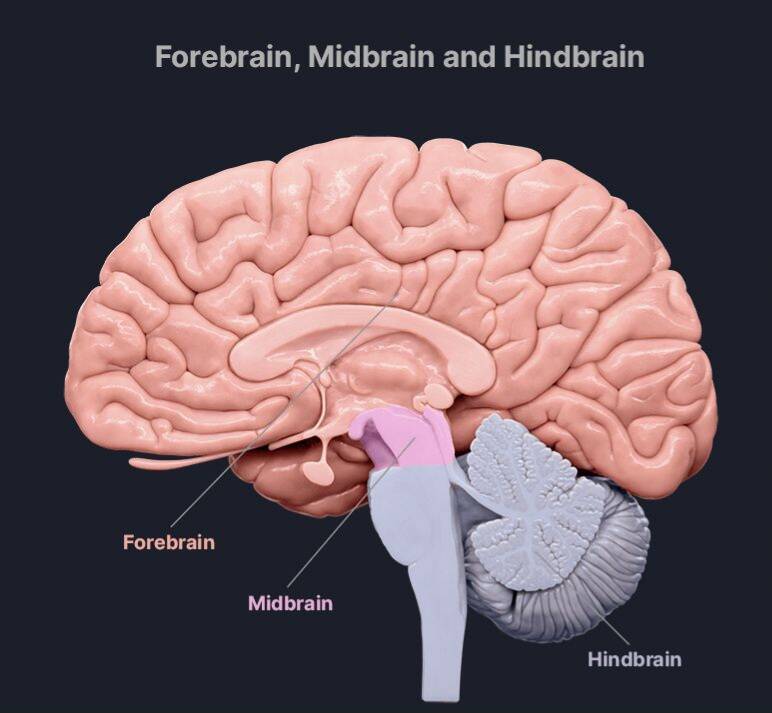
Why Your Brain Can't Decide Between Hunger and Horniness: The Dopamine Drama Explained
Alright, let's dive deep into the fascinating, sometimes chaotic, world inside our heads. We’re talking about the ultimate vibe check: that constant tug-of-war between wanting a whole pizza to yourself and, well, wanting something else entirely. Get ready, because we’re about to unpack why your brain’s always playing matchmaker between your stomach and… everything else.
Your Brain on Thirst Traps & Tinder: Why You Want Food and Sex So Badly
Okay, so let’s spill the tea. We’ve all heard whispers about the "Masturbation Diet," right? And for the record, before anyone gets it twisted, it’s NOT some magic weight-loss hack. Seriously, stop googling that. What we are talking about is something way more lit: the wild, highly evolved balance happening inside our brains between our craving for a juicy burger and our craving for… well, you know.
Look, our brains are the ultimate supercomputers, running a gazillion programs simultaneously to keep us vibing. Two of the most essential apps running constantly are our need for food (gotta survive!) and our desire for sex (gotta keep humanity going!). While they might seem like totally different quests, they actually share some seriously similar brain pathways. Think of it like a shared VIP lounge in your skull, called the mesolimbic dopamine system. But don’t get it twisted –
while they might share a lounge, they’ve got their own distinct control centers in the hypothalamus, which is basically the chill manager of our basic body functions and survival urges. We’re talking breathing, balance, coordination, hunger, mating, and even self-defense. This whole setup—brain stem, cerebellum, basal ganglia—is sometimes playfully called our "lizard brain."
So, buckle up! We’re about to explore the epic showdown between our hunger for actual food and our hunger, or "horniness," for sex. We’ll uncover why your brain decides whether you’re about to smash a meal or, well, smash something else.
The Dopamine Drop: Why We Crave What We Crave
Ever felt that rush when you bite into your favorite snack or when things are getting spicy with someone? That’s dopamine, baby! This neurotransmitter is basically your brain’s hype person, pumping out good vibes when you do something rewarding. And guess what? Both food and sex are major dopamine triggers.

The Mesolimbic Dopamine System: Your Brain’s Reward Highway
This system is your brain’s personal reward pathway, and it’s super important for regulating both sexual and feeding behaviors. It includes a couple of key spots:
- Ventral Tegmental Area (VTA): Think of this as the main factory producing dopamine.
- Nucleus Accumbens (NAc): This is where all the dopamine gets processed, making you feel those sweet, sweet feelings of pleasure and motivation.
When we experience something rewarding, whether it’s a delicious bite or a steamy moment, our VTA pumps out dopamine, and the NAc lights up like a Christmas tree. This feels good, right? So, your brain logs it as a "must-repeat" experience. This shared neural basis for pleasure is why both a gourmet meal and a hot encounter can make you feel amazing.
It’s hardwired. This isn't some niche thing; whether you're a Black man crushing it, any man figuring things out, or anyone across the gender spectrum, these brain hacks are hardwired into all of us. And hey, if you like jacking off, you’re tapping into the same core brain pathways that scream "reward!" It’s all part of the same biological system.
The Hypothalamus: The Brain’s Master Conductor
While the dopamine system is all about the "reward" and "motivation" part, the hypothalamus is where the real specific decisions get made. Located at the base of our brain, it’s like the ultimate control center for keeping our body in balance (what scientists call homeostasis). Among its many superpowers, it specifically manages your hunger for food and your desire for reproductive behaviors.
Besides feeding and sex, this little powerhouse dictates so much more:
- Thirst and water intake
- Heart rate and blood pressure
- Body temperature
- Sex drive (obviously!)
- Emotional expression
- Learning and memory (yep!)
- Even breastfeeding!
It’s pretty much the CEO of your body’s essential functions.
Hunger for Food: The ARC’s Vibe Check
When it comes to grub, the arcuate nucleus (ARC) within the hypothalamus is the main player. It’s got two main teams of neurons:
- The "Feed Me!" Crew (Orexigenic Neurons): These guys are all about making you hungry. They produce peptides like:
- Neuropeptide Y (NPY): Your brain’s equivalent of "I’m starving!"
- Agouti-related peptide (AgRP): Also screams "Time to eat, ASAP!"
- The "Chill Out, You’re Full" Squad (Anorexigenic Neurons): These are the ones that tell you to put the fork down. They make peptides like:
- Pro-opiomelanocortin (POMC): Your brain’s "I’m good, thanks."
- Cocaine- and Amphetamine-Regulated Transcript (CART): Helps shut down your appetite.
So, when your stomach growls, it’s these tiny chemical messengers doing their thing, telling your brain it’s time to refuel.
Hunger for Sex: The Spicy Side of Your Brain
Sexual desire and behavior are handled by other specific spots in the hypothalamus, like the medial preoptic area (mPOA) and the ventromedial hypothalamus (VMH). These areas are super sensitive to your sex hormones—estrogen, progesterone, testosterone, you name it. They’ve got neurons that churn out their own special peptides and neurotransmitters that get you in the mood, trigger arousal, and drive sexual activity.
The Overlap: Messengers with Multiple Gigs
Sometimes, these messengers moonlight! For example:
- Kisspeptin: This bad boy is a key player in puberty and fertility, basically giving the green light for your body to mature and get ready for reproduction. But get this – it can also influence your feeding habits!
- Ghrelin: Known as the "hunger hormone" (it makes you wanna eat!), ghrelin also gets involved in tweaking your reproductive hormones.
This crossover shows us that our body’s systems are way more interconnected than we might think. It’s like a complex web where everything influences everything else.
The Ultimate Showdown: Food vs. Sex
Here’s where it gets really interesting: our hypothalamus often plays favorites, and it can actually put one fundamental drive on pause for the other. It’s called reciprocal inhibition, and it totally makes evolutionary sense.
When Hunger Hits, Sex Takes a Backseat
Imagine you’re stranded on a deserted island. Are you thinking about getting it on, or are you desperately searching for a coconut? Exactly. When your body is in full-on survival mode, needing food is the absolute priority. Your brain cranks up those "feed me" peptides like NPY and AgRP, and they essentially tell your sex drive to chill TF out.
This is totally smart – you need energy to hunt or gather, and the energy required for, well, other activities can be conserved until you’ve secured some grub. Plus, for women, enough body fat and nutrition are crucial for regular menstruation and all the hormonal signals that prime sexual activity. Survival first, reproduction second (but always important!).
When Sex is on the Brain, Food Can Wait
Conversely, when conditions are favorable and your body feels secure, it pushes you towards reproduction. When sexual activity is prioritized, peptides like kisspeptin and other neurotransmitters involved in arousal can actually dial down your hunger. It's like your brain is saying, "Okay, we’re good on resources, let’s focus on perpetuating the species!" This ensures that your body’s energy and focus are channeled towards making babies (or just having fun) when the time is right.
So, the next time you’re debating between a late-night snack and, perhaps, some self-love or connecting with a partner, remember it’s not just you. It’s your ancient brain, working tirelessly to balance these primal drives, making sure you (and humanity) keep thriving. Understanding these internal battles isn't just cool science; it helps us make sense of our own urges and realize that we're all just complex, beautiful biological machines doing our best to survive and connect.

FAQs: Let's Get Real About Our Brains
Q1: So, if I'm super hungry, will I be less
horny? A1: Generally, yeah! If your body's in serious survival mode (like, you haven't eaten in ages), your brain tends to prioritize getting food. It’s all about resource allocation. Your sex drive might take a backseat until you’re well-fed.
Q2: Does stress affect this food/sex balance?
A2: Big time! Stress messes with so many brain functions. Chronic stress can throw off your hormonal balance and dopamine pathways, potentially leading to increased cravings for comfort food OR a decrease in libido. It's all connected.
Q3: Is it possible for someone to lose their sex drive if they’re severely underweight or malnourished?
A3: Absolutely. For your body to even consider reproduction, it needs to know it has the resources to support it. Severe malnourishment or being underweight often leads to hormonal imbalances that can severely diminish libido and even stop reproductive cycles (like menstruation in women).
Q4: Can satisfying one craving (like eating) make me less likely to want the other (sex)?
A4: Sometimes! As we discussed, there’s reciprocal inhibition. So, after a huge, satisfying meal, you might feel less inclined for sexual activity as your body focuses on digestion and nutrient absorption. Vice versa, being sexually satisfied might temporarily reduce hunger.
Q5: Is there a way to "hack" this system to my advantage?
A5: Not really "hack" it, but understanding it helps. If you notice you're always reaching for food when you're actually just bored or anxious, knowing your brain's wiring might help you find other dopamine-boosting activities (like exercise, hobbies, or even social connection, or yes, self-pleasure) instead of defaulting to snacks. It’s about being mindful of your body’s signals.
Key Takeaways for Navigating Your Brain’s Drives:
Here’s the TL;DR on why your brain’s always playing this wild game:
- Dopamine is the MVP: Both food and sex trigger dopamine release, making them feel good and motivating us to seek them out again. It’s your brain’s way of saying, "More of that, please!"
- The Hypothalamus is the Boss: This tiny but mighty brain region separately manages hunger for food and desire for sex, ensuring we survive and reproduce effectively.
- Survival First, Then... Fun: When basic survival needs (like food) are urgent, your brain prioritizes them, often putting your sex drive on pause.
- It’s a Two-Way Street: When things are good and you’re in the mood, your brain can dial down the hunger signals to focus on reproductive activities.
- We’re All Wired This Way: These aren’t unique quirks; they’re fundamental biological mechanisms that are part of the human experience for everyone, whether you’re a Black man, any man, or anyone else on this planet.
- Understanding is Power: Knowing how your brain balances these desires can help you understand your own urges better and respond to them mindfully, rather than just reacting.
So, next time you feel those conflicting urges, remember: it’s just your super-smart brain doing what it’s evolved to do. Give it a high-five (metaphorically, of course) and listen to what it’s trying to tell you.
Related Topics:


Add comment
Comments